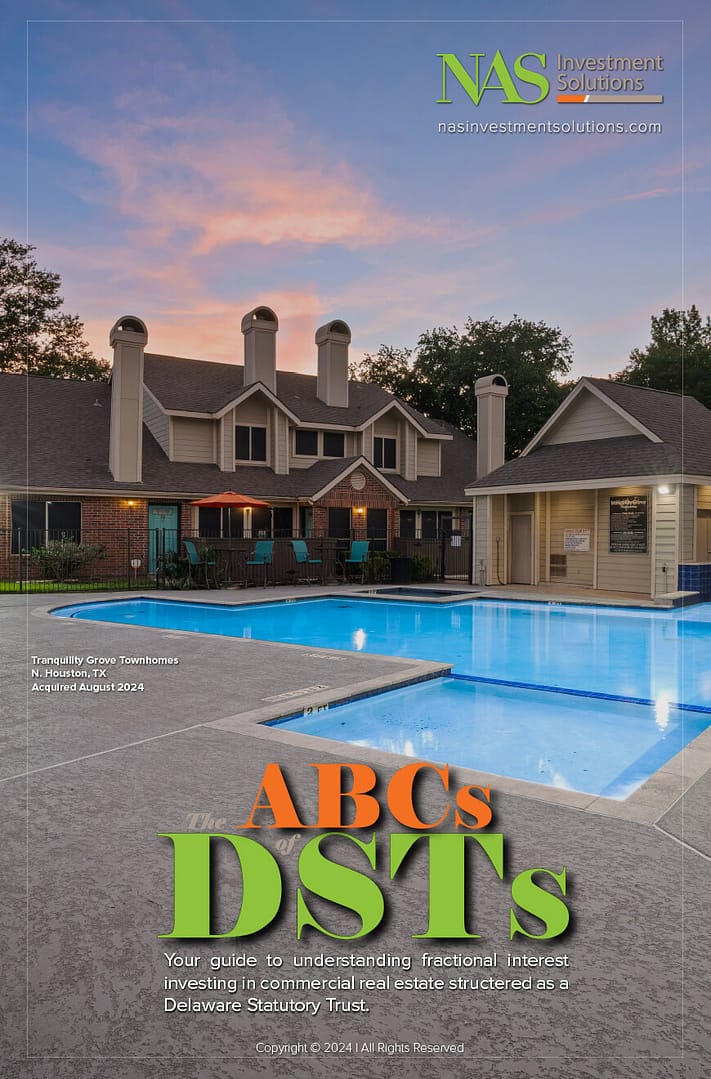Investors analyzing passive real estate investments are frequently faced with making the choice between investing in a Delaware Statutory Trust (DST) or purchasing part of a tenant in common property (TIC). This situation often occurs on the acquisition or replacement side of a like-kind 1031 tax deferred exchange.
Real estate investors look for passive replacement property because – while they enjoy the many financial and tax benefits that investing in real estate provides – they’re tired of the responsibilities that come with day-to-day management of real estate. DSTs and TICs also allow the investor to own part of a large, investment grade property that he would otherwise not have access to.
Two types of proportional ownership structures
There are two types of fractional ownership structures recognized by the IRS for use in 1031 tax deferred exchanges: Delaware Statutory Trust and Tenant in Common. Prior to 2004 only property that was solely owned or part of a TIC qualified for the tax deferral benefits 1031 exchanges provide. But in 2004 a favorable IRS ruling allowed the use of DSTs – with specific restrictions – in a like-kind 1031 exchange.
Since that time the use of tenant in common structures in 1031 tax deferred exchanges has decreased while the use of Delaware Statutory Trusts in 1031s has increased. There are pros and cons to each structure, and real estate investors should carefully consider which of these two types of proportional real estate ownership is right for them.
TIC or Tenant in Common: the pros and cons
A TIC, or tenancy in common investment, is real estate that is co-owned with other investors. TIC offerings are marketed by real estate professionals, oftentimes as pre-packaged offerings, and are typically not considered to be securities.
By default, the ownership percentage of a TIC is proportional, with each investor directly owning an undivided percentage of the property pro rata to this or her equity investment.
For example, if Bob has $750,000 to invest and locates a $1.5 million property to purchase, he may ask his friends Joe, Mary, and Jane to each invest $250,000 as tenants in common. Bob would directly own 50% of the property while Joe, Mary and Jane would each directly own 16.666667%.
Advantages of TICs
There are several advantages to owning property as a tenant in common:
- Access to owning potentially investment grade, institutional quality commercial real estate for a fraction of the cost of 100% ownership – the “bigger is better” concept.
- Independent third-party property management and leasing teams are typically employed by the TIC owners to professionally manage the asset
- An investor can trade into a TIC property with a 1031 exchange and can, likewise, trade out into another 1031 exchange
Disadvantages of TICs
Tenant in Common Agreements requiring owners to take an active part in decision making is also one of the biggest drawbacks to a TIC, especially for real estate investors seeking a truly passive, hands-off investment. TICs require unanimity to sell, refinance, replace the asset manager, replace the property manager and establish lease rates and approve all leases. This is difficult to achieve, especially under time constraints in working with selling the property or leasing to a new tenant. Absent unanimity time kills deals and deals have been lost to foreclosure because 100% agreement was not achieved.
The lenders are now keenly aware of the issues in managing the TIC approval process and as a result most lenders prefer to not work with TICs, but will consider lending to a TIC group with up to 10-12 TICs.
DST or Delaware Statutory Trust: the pros and cons
Under a Delaware Statutory Trust each investor holds title to the real estate through a beneficial interest in the trust and not through direct ownership as with a TIC structure.
Advantages of DSTs
DST investors also have access to owning investment grade commercial real estate. However, because Delaware Statutory Trusts are entities, investors also benefit from several advantages unique to DSTs that are not found with TICs:
- Completely passive investment as all major property decisions are made by a trustee of the trust or asset manager, not by the owners – in other words, no decisions made by investors throughout the hold period
- Investors are shielded from potential liability because they own beneficial interests in the DST and not the real estate itself
- Financial institutions can make loans to the DST entity directly without each individual investor having to qualify for the loan

Disadvantages of DSTs
The entity structure of a Delaware Statutory Trust also creates several potential disadvantages for investors:
- No “fresh cash” can be brought into the deal in the event of a major need for capital
- Although lenders do not underwrite each DST investor or receive personal guarantees for loans, the property in the DST is used as loan collateral and is 100% at risk if conditions in the real estate market unexpectedly change
- A DST must sell in no more than 10 years, it cannot refinance in the property to which it holds title
Further restrictions on DSTs used for 1031 exchanges
The IRS places several prohibitions on the power of DST trustees if the Delaware Statutory Trust is to be used with a 1031 tax deferred exchange. There are seven restrictions, sometimes referred to as the ‘Seven deadly sins of a DST’:
- Once a DST offering is closed there can be no further contributions by current owners, new owners, or beneficiaries
- Existing loan terms cannot be renegotiated, nor can new funds be borrowed, by the DST trustee
- Sales proceeds from the investment real estate cannot be reinvested by the DST trustee
- Capital expenditures can only be made by the DST trustee for normal repair and maintenance, minor non-structural capital improvements, or those required by law (such as items related to zoning codes)
- Liquid cash held by the DST between distribution dates can only be invested in short-term debt obligations
- All cash in excess of necessary reserves must be distributed to investors
- New leases or renegotiations of current leases may not be entered into by the DST trustee










